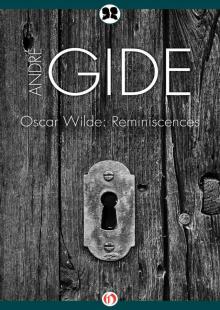- Home
- André Gide
The Counterfeiters: A Novel Page 19
The Counterfeiters: A Novel Read online
Page 19
“What a child you are, Bernard! I am not free either,” she said, taking away her hand. “Here! Read this.”
She took from her bodice a crumpled piece of paper, which she held out to Bernard.
Bernard saw the signature first of all. As he feared, is was Felix Douviers’. One moment he kept the letter in his hand without reading it; he raised his eyes to look at Laura. She was crying. Then Bernard felt one more bond burst in his heart—one of the secret ties which bind each one of us to himself, to his selfish past. Then he read:
MY BELOVED LAURA,
In the name of the little child who is to be born, and whom I swear to love as if I were its father, I beseech you to come back. Don’t think that any reproaches will meet you here. Don’t blame yourself too much—that is what hurts me most. Don’t delay. My whole soul awaits you, adores you, is laid humbly at your feet.
Bernard was sitting on the floor in front of Laura, but it was without looking at her that he asked:
“When did you get this?”
“This morning.”
“I thought he knew nothing about it. Did you write and tell him?”
“Yes; I told him everything.”
“Does Edouard know this?”
“He knows nothing about it.”
Bernard remained silent a little while with downcast head; then turning towards her once more:
“And … what do you mean to do now?”
“Do you really ask?… Return to him. It is with him that my place is—with him that I ought to live. You know it.”
“Yes,” said Bernard.
There was a very long silence. Bernard broke it:
“Do you believe one can love someone else’s child as much as one’s own, really?”
“I don’t know if I believe it, but I hope it.”
“For my part, I believe one can. And, on the contrary, I don’t believe in what people call so foolishly ‘the blood speaking.’ I believe this idea that the blood speaks is a mere myth. I have read somewhere that among certain tribes of South Sea Islanders, it is the custom to adopt other people’s children, and that these adopted children are often preferred to the others. The book said—I remember it quite well—‘made more of.’ Do you know what I think now?… I think that my supposed father, who stood in my father’s place, never said or did anything that could let it be suspected that I was not his real son; that in writing to him as I did, that I had always felt the difference, I was lying; that, on the contrary, he showed a kind of predilection for me, which I felt perfectly, so that my ingratitude towards him was all the more abominable; and that I behaved very ill to him. Laura, my friend, I should like to ask you … Do you think I ought to beg his pardon and go back to him?”
“No,” said Laura.
“Why not? Since you are going back to Douviers?”
“You were telling me just now, that what was true for one is not true for another. I feel I am weak; you are strong. Monsieur Profitendieu may love you; but from what you have told me, you are not of the kind to understand each other.… Or, at any rate, wait a little. Don’t go back to him worsted. Do you want to know what I really think?—that it is for me and not for him that you are proposing it—to get what you called ‘my esteem.’ You will only get it, Bernard, if I feel you are not seeking for it. I can only care for you as you are naturally. Leave repentance to me. It is not for you, Bernard.”
“I almost get to like my name when I hear it on your lips. Do you know what my chief horror was at home? The luxury. So much comfort, so many facilities … I felt myself becoming an anarchist. Now, on the contrary, I think I’m veering toward conservatism. I realized that the other day because of the indignation that seized me when I heard the tourist at the frontier speak of his pleasure in cheating the customs. ‘Robbing the State is robbing no one,’ he said. My feeling of antagonism made me suddenly understand what the State was. And I began to have an affection for it, simply because it was being injured. I had never thought about it before. ‘The State is nothing but a convention,’ he said, too. What a fine thing a convention would be that rested on the bona fides of every individual!… if only there were nothing but honest folk. Why, if anyone were to ask me to-day what virtue I considered the finest, I should answer without hesitation—honesty. Oh, Laura! I should like all my life long, at the very smallest shock, to ring true, with a pure, authentic sound. Nearly all the people I have known ring false. To be worth exactly what one seems to be worth—not to try to seem to be worth more.… One wants to deceive people, and one is so much occupied with seeming, that one ends by not knowing what one really is.… Forgive me for talking like this. They are my last night’s reflections.”
“You were thinking of the little coin you showed us yesterday. When I go away …”
She could not finish her sentence; the tears rose to her eyes and in the effort she made to keep them back, Bernard saw her lips tremble.
“Then you are going away, Laura …” he went on sadly. “I am afraid that when I no longer feel you near me, I shall be worth nothing at all—or hardly anything.… But, tell me—I should like to ask you … would you be going away—would you have made this confession, if Edouard … I don’t know how to say it …” (and as Laura blushed), “if Edouard had been worth more? Oh, don’t protest. I know so well what you think of him.”
“You say that, because yesterday you caught me smiling at what he said; you immediately jumped to the conclusion that we were judging him in the same way. But it’s not so. Don’t deceive yourself. In reality I don’t know what I think of him. He is never the same for long together. He is attached to nothing, but nothing is more attractive than his elusiveness. He is perpetually forming, unforming, re-forming himself. One thinks one has grasped him.… Proteus! He takes the shape of what he loves, and oneself must love him to understand him.”
“You love him. Oh, Laura! it’s not of Douviers I feel jealous, nor of Vincent; it’s of Edouard.”
“Why jealous? I love Douviers; I love Edouard, but differently. If I am to love you, it must be with yet another love.”
“Laura, Laura, you don’t love Douviers. You feel affection for him, pity, esteem; but that’s not love. I think the secret of your sadness (for you are sad, Laura) is that life has divided you; love has only consented to take you, incomplete; you distribute among several what you would have liked to give to one only. As for me, I feel I am indivisible; I can only give the whole of myself.”
“You are too young to speak so. You cannot tell yet whether life will not ‘divide’ you too, as you call it. I can only accept from you the … devotion which you offer me. The rest will have its exigencies and will have to be satisfied elsewhere.”
“Can it be true? Do you want to disgust me before hand with myself and with life, too?”
“You know nothing of life. Everything is before you. Do you know what my mistake was? To think there was nothing more for me. It was when I thought, alas! that there was nothing more for me, that I let myself go. I lived that last spring at Pau as if I were never to see another—as if nothing mattered any more. I can tell you now, Bernard, now that I’ve been punished for it— Never despair of life!”
Of what use is it to speak so to a young creature full of fire? And indeed Laura was hardly speaking to Bernard. Touched by his sympathy, and almost in spite of herself, she was thinking aloud in his presence. She was unapt at feigning, unapt at self-control. As she had yielded a moment ago to the impulsive feeling which carried her away whenever she thought of Edouard, and which betrayed her love for him, so now she had given way to a certain tendency to sermonize, which she had no doubt inherited from her father. But Bernard had a horror of recommendations and advice, even if they should come from Laura; his smile told her as much and she went on more calmly:
“Are you thinking of keeping on as Edouard’s secretary when you go back to Paris?”
“Yes, if he is willing to employ me; but he gives me nothing to do. Do you know what would amuse me? To write that book
of his with him; for he’ll never write it alone; you told him so yesterday. That method of working he described to us seemed to me absurd. A good novel gets itself written more naively than that. And first of all, one must believe in one’s own story—don’t you think so—and tell it quite simply? I thought at one time I might help him. If he had wanted a detective, I might perhaps have done the job. He could have worked on the facts that my police work would have furnished him.… But with an idea-monger there’s nothing doing. When I’m with him, I feel that I have the soul of a reporter. If he sticks to his mistaken ways, I shall work on my own account. I must earn my living. I shall offer my services to a newspaper. Between times I shall write verses.”
“For when you are with reporters, you’ll certainly feel yourself the soul of a poet.”
“Oh! don’t laugh at me. I know I’m ridiculous. Don’t rub it in too much.”
“Stay with Edouard; you’ll help him; and let him help you. He is very good.”
The luncheon bell rang. Bernard rose. Laura took his hand:
“Just one thing—that little coin you showed us yesterday … in remembrance of you, when I go away”—she pulled herself together and this time was able to finish her sentence—“would you give it me?”
“Here it is,” said Bernard, “take it.”
V : Edouard’s Journal: Conversation with Sophroniska
C’est ce qui arrive de presque toutes les maladies de l’esprit humain qu’on se flatte d’avoir guéries. On les répercute seulement, comme on dit en médecine, et on leur en substitue d’autres.
SAINTE-BEUVE (Lundis, 1, p. 19).
I am beginning to catch sight of what I might call the “deep-lying subject” of my book. It is—it will be—no doubt, the rivalry between the real world and the representation of it which we make to ourselves. The manner in which the world of appearances imposes itself upon us, and the manner in which we try to impose on the outside world our own interpretation—this is the drama of our lives. The resistance of facts invites us to transport our ideal construction into the realm of dreams, of hope, of belief in a future life, which is fed by all the disappointments and disillusions of our present one. Realists start from facts—fit their ideas to suit the facts. Bernard is a realist. I am afraid we shall never understand each other.
How could I agree when Sophroniska told me I had nothing of the mystic in me? I am quite ready to recognize, as she does, that without mysticism man can achieve nothing great. But is it not precisely my mysticism which Laura incriminates when I speak of my book?… Well, let them settle the argument as they please.
Sophroniska has been speaking to me again about Boris, from whom she thinks she has succeeded in obtaining a full confession. The poor child has not got the smallest covert, the smallest tuft left in him, where he can take shelter from the doctor’s scrutiny. He has been driven into the open. Sophroniska takes to bits the innermost wheels of his mental organism and spreads them out in the broad daylight, like a watchmaker cleaning the works of a clock. If after that he does not keep good time, it’s a hopeless job. This is what Sophroniska told me:
When Boris was about nine years old, he was sent to school at Warsaw. He there made friends with a schoolfellow one or two years older than himself—one Baptistin Kraft, who initiated him into certain clandestine practices, which the children in their ignorance and astonishment believed to be “magic.” This is the name they bestowed upon their vice, from having heard or read that magic enables one in some mysterious way to gain possession of what one wishes for, that it gives unlimited powers and so forth.… They believed in all good faith that they had discovered a secret which made up for real absence by illusory presence, and they freely put themselves in a state of hallucination and ecstasy, gloating over an empty void, which their heated imagination, stimulated by their desire for pleasure, filled to overflowing with marvels. Needless to say, Sophroniska did not make use of these terms; I should have liked her to repeat exactly what Boris said, but she declares she only succeeded in making out the above—though she certified its accuracy—through a tangle of pretences, reticence and vagueness.
“I have at last found out the explanation of something I have been trying to discover for a long time past,” she added, “—of a bit of parchment which Boris used always to wear hanging round his neck in a little sachet, along with the religious medallions his mother forces him to wear. There were six words on it, written in capital letters in a childish, painstaking hand—six words whose meaning he never would tell me.
“GAS … TELEPHONE … ONE HUNDRED
THOUSAND ROUBLES
“ ‘But it means nothing—it’s magic,’ he used always to answer whenever I pressed him. That was all I could get out of him. I know now that these enigmatic words are in young Baptistin’s handwriting—the grand master and professor of magic—and that these six words were the boys’ formula of incantation—the ‘Open Sesame’ of the shameful Paradise, into which their pleasure plunged them. Boris called this bit of parchment, his talisman. I had great difficulty in persuading him to let me see it and still greater in persuading him to give it up (it was at the beginning of our stay here); for I wanted him to give it up, as I know now that he had already given up his bad habits. I had hopes that the tics and manias from which he suffers would disappear with the talisman. But he clung to it and his illness clung to it as to a last refuge.”
“But you said he had already given up his bad habits.… ”
“His nervous illness only began after that. It arose no doubt from the constraint Boris was obliged to exercise in order to get free from them. I have just learnt from him that his mother caught him one day in the act of ‘doing magic,’ as he says. Why did she never tell me?… out of false shame? …”
“And no doubt because she knew he was cured.”
“Absurd!… And that is why I have been in the dark so long. I told you that I thought Boris was perfectly pure.”
“You even told me that you were embarrassed by it.”
“You see how right I was!… The mother ought to have warned me. Boris would be cured already if I had known this from the beginning.”
“You said these troubles only began later on.… ”
“I said they arose as a protestation. His mother, I imagine, scolded, begged, preached. Then his father died. Boris was convinced that this was the punishment of these secret practices he had been told were so wicked; he held himself responsible for his father’s death; he thought himself criminal, damned. He took fright; and it was then that his weakly organism, like a tracked animal, invented all these little subterfuges, by means of which he works off his secret sense of guilt, and which are so many avowals.”
“If I understand you rightly, you think it would have been less prejudicial to Boris if he had gone quietly on with his ‘magic’?”
“I think he might have been cured without being frightened. The change of life which was made necessary by his father’s death would have been enough, no doubt, to distract his attention, and when they left Warsaw he would have been removed from his friend’s influence. No good result is to be arrived at by terror. Once I knew the facts, I talked the whole thing over with him, and made him ashamed of having preferred the possession of imaginary goods to the real goods which are, I told him, the reward of effort. Far from attempting to blacken his vice, I represented it to him simply as one of the forms of laziness; and I really believe it is—the most subtle—the most perfidious.”
These words brought back to my mind some lines of La Rochefoucauld, which I thought I should like to show her, and, though I might have quoted them by heart, I went to fetch the little book of Maxims, without which I never travel. I read her the following:
“Of all the passions, the one about which we ourselves know least is laziness, the fiercest and the most evil of them all, though its violence goes unperceived and the havoc it causes lies hidden.… The repose of laziness has a secret charm for the soul, suddenly suspending its most ardent pur
suits and most obstinate resolutions. To give, in fine, some idea of this passion, it should be said that laziness is like a state of beatitude, in which the soul is consoled for all its losses, and which stands in lieu to it of all its possessions.” 1“Do you mean to say,” said Sophroniska then, “that La Rochefoucauld was hinting at what we have been speaking of, when he wrote that?”
“Possibly; but I don’t think so. Our classical authors have a right to all the interpretations they allow of. That is why they are so rich. Their precision is all the more admirable in that it does not claim to be exclusive.”
I asked her to show me this wonderful talisman of Boris’s. She told me it was no longer in her possession, as she had given it to a person who was interested in Boris and who had asked her for it as a souvenir. “A certain M. Strouvilhou, whom I met here some time before your arrival.”
I told Sophroniska then, that I had seen the name in the visitors’ book, and that as I had formerly known a Strouvilhou, I was curious to learn whether it was the same. From the description she gave of him it was impossible to doubt it. But she could tell me nothing that satisfied my curiosity. I merely learnt that he was very polite, very attentive, that he seemed to her exceedingly intelligent, but a little lazy, “if I dare still use the word,” she added, laughing. In my turn I told her all I knew of Strouvilhou, and that led me to speak of the boarding school where we had first met, of Laura’s parents (she too had been confiding in her), and finally of old La Pérouse, of his relationship with Boris, and of the promise I had made him to bring the child back to Paris. As Sophroniska had previously said that it was not desirable Boris should live with his mother, “Why don’t you send him to Azaïs’s school?” I asked. In suggesting this, I was thinking especially of his grandfather’s immense joy at having him so near, and staying with friends where he could see him whenever he liked. Sophroniska said she would think it over; extremely interested by everything I told her.

 Oscar Wilde
Oscar Wilde The White Notebook
The White Notebook The Counterfeiters: A Novel
The Counterfeiters: A Novel Urien’s Voyage
Urien’s Voyage The Pastoral Symphony
The Pastoral Symphony The Counterfeiters
The Counterfeiters Urien's Voyage
Urien's Voyage